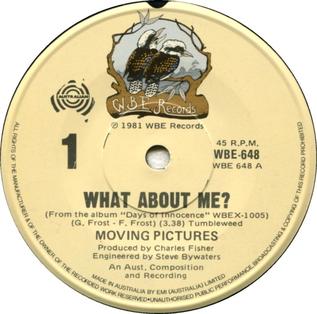
Kissing to Be Clever is the debut album by the English band Culture Club, released on 8 October 1982 in the United Kingdom. It includes Culture Club's international breakthrough hit single, "Do You Really Want to Hurt Me", which reached number one in the band's native UK and the top 10 of many charts around the world. The album has reportedly sold over 4 million copies worldwide, including over 1 million in the US where it has been certified Platinum by the RIAA.
Edie Brickell & New Bohemians is an American alternative rock jam band that originated in Dallas, Texas, in the mid-1980s. The band is widely known for their 1988 hit "What I Am" from the album Shooting Rubberbands at the Stars. Their music contains elements of rock, folk, blues, and jazz. Following the 1990 release of their second album Ghost of a Dog, lead singer Edie Brickell left the band and married singer-songwriter Paul Simon. In 2006, she and the band launched a new web site and released a new album, Stranger Things.

Malaysian Idol is the Malaysian version of the Idol Series that started in UK, similar to shows such as UK's Pop Idol and American Idol in the franchise. This show is a contest to determine the best young singer in Malaysia, with the winner receiving a major record deal, although some runners-up have achieved enough fame to ink record deals of their own. Like any other Idol show, the winner is decided by public votes. The Malaysian Idol series has gained a following in Malaysia from people of all ages partly due to their interest in American Idol which had been introduced a few years prior. Malaysian Idol has been broadcast to Malaysian viewers via terrestrial television, 8TV and TV3.
New Zealand Idol, also known as NZ Idol, was the New Zealand version of the Idol series which originated in the United Kingdom as Pop Idol. New Zealand first saw the Idol format when TV2 aired American Idol 2, which garnered impressive ratings. After Australian Idol also received good ratings in New Zealand, TVNZ decided to order the first season of NZ Idol, which was broadcast on TV2. After the third season in 2006, TVNZ made a decision not to fund or broadcast a fourth season.

Breakaway is the second studio album by American pop singer Kelly Clarkson, released on November 30, 2004, by RCA Records. The album is the follow-up to her successful debut album, Thankful (2003). Breakaway sees Clarkson collaborating with various producers and songwriters for the first time, primarily Dr. Luke, Max Martin, John Shanks, Kara DioGuardi, Ben Moody, and David Hodges; the latter two are former members of American rock band Evanescence. Despite the established commercial success of Thankful, music critics still continued to typecast Clarkson as an American Idol winner and were also critical of her attempts of establishing a commercial appeal on her own. Wanting to stray from those, she was convinced by Clive Davis to work with Dr. Luke and Martin in Stockholm, and with Moody and Hodges in Los Angeles, in pursuit of a pop rock direction. This also led her to part ways with her manager Simon Fuller and hire the management services of Jeff Kwatinetz before the album's release. Breakaway is primarily a pop rock record with elements of rock and soul music, marking a departure from the R&B-oriented sound of Thankful; its lyrics explore themes of heartbreak, love, and escapism.
Aishah and The Fan Club, better known as The Fan Club or just Fan Club, were a New Zealand-based pop and dance band in the late 1980s and early 1990s. The group released their first album Sensation in 1988, which spawned three top-20 singles in the New Zealand and Malaysian charts: "Sensation", "Paradise" and "Call Me" – the latter being a remake of a Spagna song of the same name.

One in a Million is a Malaysian reality-competition show. It is the first reality singing competition to offer a RM 1 million prize to the winner. The show began airing on 8TV, a terrestrial television station in Malaysia, on 26 May 2006.

"What About Me" is a song written by Garry Frost and Frances Swan. It was first recorded by Australian rock band Moving Pictures, of which Garry Frost was a member, for its 1981 debut album, Days of Innocence. It became the band's first and only number-one single in Australia, spending six weeks atop the Kent Music Report; it was the second-highest-selling single of 1982 there. At the 1982 Countdown Music Awards, the song won Best Australian Single. In January 2018, as part of Triple M's "Ozzest 100", the 'most Australian' songs of all time, "What About Me" was ranked number 37.

Respect the Beat is the second studio album by New Zealand band Aishah and The Fan Club, released in 1989 by CBS Records as well as Epic Records in some territories. The album, produced by Mark S. Berry, reached No. 28 in New Zealand, where it was nominated for Album of the Year at the 1989 New Zealand Music Awards. Its success resulted in The Fan Club earning the International Recognition award at the 1990 Awards. However, Respect the Beat was the band's final album as lead singer Aishah decided to return to her native Malaysia, where the band was most successful, to pursue a solo career recording in the Malay language.

The discography of Dead or Alive, a British dance-pop group, consists of six studio albums, seven compilation albums, twenty-eight singles, and two video albums. Formed by frontman Pete Burns in 1980 in Liverpool, the band were first signed to the independent Rough Trade label in 1982, though moved to Epic Records the following year. Their debut album, Sophisticated Boom Boom, was released in 1984, producing a series of minor hits in the UK, most notably their version of "That's the Way " which gave them their first UK Top 40 hit.
One in a Million is Malaysia's first ever reality singing competition to offer a RM 1 million prize to the winner. The second season began on 16 November 2007, resuming to its former timeslot at 9:30 pm on 8TV. The season had been marred by a restriction imposed on 8TV against airing live telecasts, as a result of season one's runner-up Faizal Tahir breaching the decency code during 8TV's birthday concert on mid-January 2008. Nevertheless, the show went on and on 29 February 2008, in a Grand Finale which was aired delayed by 30 minutes from Shah Alam, Sabahan Norayu Damit became the overall champion and new owner of RM1,000,000 as funding for a musical career.

Mark Williams is a New Zealand singer with Recording Industry Association of New Zealand (RIANZ) number one hit singles, "Yesterday Was Just the Beginning of My Life" (1975) and a cover of Buddy Holly's "It Doesn't Matter Anymore" (1977) before he relocated to Australia later that year. His single, "Show No Mercy" (1990) was a top ten hit in both countries. He has undertaken extensive touring in support of numerous Australian bands and worked in television. In 2006 he became the vocalist for the reformed New Zealand band, Dragon.

Boys & Girls 1+1=3 is a Malaysian pop/rock compilation album produced by New Zealander Paul Moss and released on January 1, 1996.

Shah Indrawan bin Ismail, known as Tomok, is a Malaysian singer and the winner of the third season of One in a Million (OIAM), a reality TV singing competition. He became the first male contestant and the first recording artist to do so in the history of the competition. He is also the lead vocalist of a Malaysian band called New Boyz.

Kimbra Lee Johnson, known mononymously as Kimbra, is a New Zealander singer and songwriter. Known for mixing pop with R&B, jazz and rock musical elements, her accolades include four ARIA Music Awards, two Grammy Awards and seven New Zealand Music Awards.
Malaysian popular music, sometimes called shortly Malaysian pop or abbreviated as M-pop, refers to popular music forms in Malaysia. Although popular music in various languages such as Mandopop are popular and have been produced in Malaysia, Malaysian pop refers to music recorded primarily in the Malay language in Malaysia.
Daniel Lee Chee Hun is a Malaysian singer most notable for winning the second season of Malaysian Idol.

The Greatest Showman: Original Motion Picture Soundtrack is the soundtrack album to the film The Greatest Showman. It was released in full on December 8, 2017, by Atlantic Records. The album contains all of the film's musical numbers, but none of the film's underscore. The first pre-order release was on October 26, 2017, with two promotional singles: "The Greatest Show" and "This Is Me". A third, "Rewrite the Stars", followed on November 17, 2017. "This Is Me" was released on December 8, 2017, as the album's official lead single. In Australia, "Rewrite the Stars" was released to radio on July 20, 2018.
Dato' Wan Aishah binti Wan Ariffin, known mononymously as Aishah, is a singer, actress, and politician from Negeri Sembilan, Malaysia.
"This Is Me" is a song performed by Keala Settle for the film The Greatest Showman. It was released on October 26, 2017, by Atlantic Records as a promotional single from The Greatest Showman: Original Motion Picture Soundtrack and the official lead single on December 8, 2017. It won the Golden Globe Award for Best Original Song at the 75th Golden Globe Awards and was nominated for an Academy Award for Best Original Song at the 90th Academy Awards. It was later nominated for the Grammy Award for Best Song Written for Visual Media at the 61st Annual Grammy Awards.










